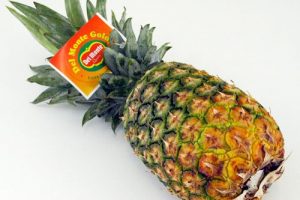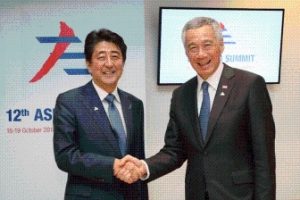Until about 10 years ago, raw pineapple from Southeast Asia was not imported into Japan. Japanese people eat agribusiness dolls and canned pineapples from Del Monte. In recent years, deregulation has been promoted by the conclusion of a free trade agreement (EPA), and the import of agricultural products has been promoted, and it has become possible to buy a whole raw pineapple at supermarkets and fruit and vegetable stores. The US giant agricultural business uses Mindanao Island, the southernmost island in the Philippines after Luzon Island, as a production base for Asian markets such as Japan, South Korea, and China. Recently, the raw pineapple from Mindanao has almost disappeared from the store. Instead, it is monopolized by Taiwanese products. The focus of the US-China conflict was on the Taiwan Strait, and the relationship between Taiwan and the continent deteriorated, and Taiwanese pineapples were banned from export to China. For this reason, it seems that the Japanese government and the ruling Liberal Democratic Party, which were urged by the US government, called on private companies to support Taiwan. The world of imported fruits is being used politically, and the sense of unity between Japan and Taiwan, which is the premise of "Taiwan emergency is Japan emergency" explained in the above article, has permeated softly on a commercial basis .
■ Reflects tension in the Taiwan Strait
Chinese customs officials have banned Taiwanese pineapples from March 1 on the pretext of "detecting pests ." In reality, it is "economic sanctions" by the Chinese government. China was the export destination of more than 95% of Taiwanese pineapples, which was a big blow to producers. Due to China's embargo, countries have begun to import Taiwanese pineapples in a hurry.
The new US administration was inaugurated on January 20, and President Biden reiterated "the new Cold War of China's tyranny and US-led democracy." China's "Taiwan sanctions" are a restraint on the US's move to restore diplomatic relations between China and Taiwan. This Taiwanese pineapple problem reflects the tension in the Taiwan Strait.

[Photo] President Tsai Ing-wen, who promotes Taiwanese pineapples to Japanese consumers Her place of birth is the largest pineapple producing area in Taiwan, along with Kaohsiung City in Pingtung County, the southernmost part of Taiwan.
The total production of Taiwanese pineapple will be 431,000 tons in 2019. The first place is the Philippines with 2,748,000 tons. The order of country production in Asia is Philippines, Indonesia, China, India, Thailand, Vietnam, Taiwan.
According to the statistics of the Ministry of Agriculture, Forestry and Fisheries of Japan , the import volume of Taiwanese pineapple in 2020 will be 2143 tons. Its share in the Japanese market was only about 1.3%. This has changed drastically since the announcement of the embargo by China. "As of March 4, 2021, Japanese businesses have pre-ordered more than 6,000 tons of Taiwanese pineapple," said Chen Chi-chung, chief member of the Agricultural Commission of Taiwan (Minister of Agriculture, Forestry and Fisheries). This quantity quickly reached a record high for exports to Japan.
■ Disappearing of Filipino Pineapple

Filipino pineapple = photo = is a little bigger than Taiwanese and the price is much cheaper. Taiwan production has exceeded the 700 yen in consumption tax Ru. On the other hand, Filipino products cost around 300 yen. The taste may be personal preference, but the quality of subtropical Taiwanese products is poor compared to the Philippine products cultivated in the highlands near the equator, which is considered to be the optimum place, at an altitude of 700 to 800 meters. Is clear. Even so, Filipino products, which until then accounted for about 80% of the Japanese market, are disappearing from stores.
It was Seiyu who started waving the flag of "Taiwan support" in Japan. It is well known that Seiyu was acquired by Wal-Mart, the largest US retailer, and is now just the "Japanese store name" of this US capital. Furthermore , sales are expanding from major supermarket chains such as Ito-Yokado and Aeon to local supermarkets. Even at the online shop, Rakuten and other companies have clarified their support stance by calling them "Let's support Taiwan!" And "Save Taiwanese farmers!" On SNS, there was a widespread voice of support saying, "Let's eat Taiwanese pineapple." Japan's center of politics (Nagatacho), such as the Liberal Democratic Party Youth Bureau, is also supporting this.
How long will the movement to support Taiwanese pineapples, which returns the market principle and economic principle, continue? It will reflect the degree of military tension in the Taiwan Strait. The Japanese are being swallowed by the dangerous propaganda that unites Taiwan and Japan against China by the Japanese government, the media and the retail industry.
■ Prime Minister Suga cancels visit to the Philippines
On the other hand , Japan's Prime Minister Suga, who was planning to visit the Philippines and India during the Golden Week holidays from the end of April, said, " We will cancel it based on the infection situation of the new coronavirus."
 Since the Abe administration, it has been customary for the Japanese Prime Minister to visit the Association of Southeast Asian Nations (ASEAN) member countries before and after his visit to the United States. That's because ASEAN countries near China have refused to join the US-led siege of China, and Washington has instructed the Japanese government to break it.
Since the Abe administration, it has been customary for the Japanese Prime Minister to visit the Association of Southeast Asian Nations (ASEAN) member countries before and after his visit to the United States. That's because ASEAN countries near China have refused to join the US-led siege of China, and Washington has instructed the Japanese government to break it.
Singapore's Prime Minister Lee Hsien Loong ( pictured right) expressed concern in March this year that "the risk of serious tensions could increase the probability of a military conflict between the United States and China in the future. " You can't choose between them. " This speaks for the long-standing consensus of ASEAN , saying, "Don't force the choice between the United States and China ."
In the Philippines, the territorial dispute over the South China Sea and the Spratly Islands has been virtually shelved since the inauguration of the pro-Chinese anti-American Duterte administration in 2016 . However, recently, a total of more than 200 surveillance vessels and fishing vessels of the China Coast Guard have been stationed in the disputed sea area, and they have been entwined with patrol vessels in the Philippines, and there is a dark cloud in the relationship between the two countries. Foreign Minister Teodoro Locsin has just tweeted that "Get the Fuck out (Chinese ships should disappear)" and has just become an international topic.
However, the Philippines, which suffers from the corona disaster, receives a large amount of vaccine from China, and President Duterte also took the initiative to inoculate a Chinese-made vaccine. The recent hard line stance of the Philippine government toward China should be seen as a restraint on the back-office work of the United States, which is trying to break down the Duterte anti-American regime in anticipation of next year's presidential election.
The Philippine government has not complained that exports of Filipino pineapple to Japan have plummeted. Because the huge profits only go into the pockets of the exclusive US agribusiness. Local pineapples and bananas are produced all over the Philippines, which are much tastier than those produced by US companies in vast plantations using the Philippine labor force, which is close to unremunerative work . The Duterte administration, which wants to help Filipino farmers become independent and seek sales channels in the international market, should be looking at the situation coldly.
